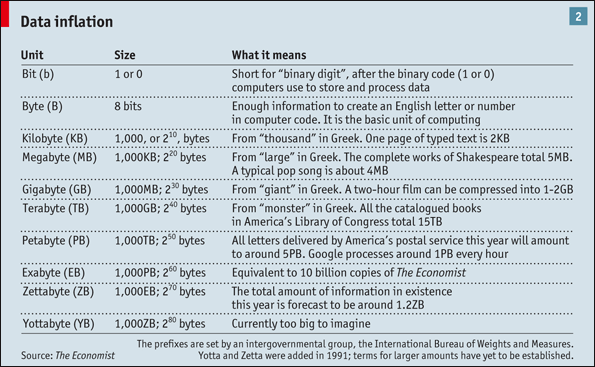It looks like you're using an Ad Blocker.
Please white-list or disable AboveTopSecret.com in your ad-blocking tool.
Thank you.
Some features of ATS will be disabled while you continue to use an ad-blocker.
share:
originally posted by: eisegesis
They will definitely need to adapt this when 4K media goes mainstream.
The First 4K Movie You Can Download Is 160GB and Absolutely Breathtaking
I HATE this chart. i know i can't change it, but 1000 KB aint a 1000 bytes.
It's 1024 bytes.
The higher the chart goes, the more significant the shortage comes.
Just sayin'
a reply to: schadenfreude
Yeah, but if you want the pedantic figure, they do follow it with the actual amount shown as an exponent of 2, and another reason it doesn't seem that far off to most people is because hard drive manufacturers tend to use the first figure in base 10 (instead of the base 2 figure) when reporting hard drive size.
So a one terabyte hard drive doesn't really have 2^40 bytes, thus it's not really a terabyte, rather it's actually the amount you're complaining is wrong, which it technically is by definition, but it turns out to be technically right for hard drive sizes because the manufacturers sort of lie about capacity. Flash memory though they report correctly, usually:
When a Byte is not a Byte: Understanding Advertised vs. Actual Drive Storage Capacities
Yeah, but if you want the pedantic figure, they do follow it with the actual amount shown as an exponent of 2, and another reason it doesn't seem that far off to most people is because hard drive manufacturers tend to use the first figure in base 10 (instead of the base 2 figure) when reporting hard drive size.
So a one terabyte hard drive doesn't really have 2^40 bytes, thus it's not really a terabyte, rather it's actually the amount you're complaining is wrong, which it technically is by definition, but it turns out to be technically right for hard drive sizes because the manufacturers sort of lie about capacity. Flash memory though they report correctly, usually:
When a Byte is not a Byte: Understanding Advertised vs. Actual Drive Storage Capacities
And if that's not bad enough, you usually end up with even less space on the hard drive because of formatting, which is a separate issue.
for each Gigabyte that a drive manufacturer claims, they are over reporting the amount of disk space by 73,741,824 Bytes or roughly 70.3 MB of disk space. So, if a manufacturer advertises an 80 GB (80 billion bytes) hard drive, the actual disk space is around 74.5 GB of space, roughly 7% less than what they advertise.
Now, this isn't true for all the drives and storage media on the market. This is where consumers have to be careful. Most hard drives are reported based on the advertised values where a Gigabyte is one billion bytes. On the other hand, most flash media storage is based around the actual memory amounts.
originally posted by: schadenfreude
originally posted by: eisegesis
They will definitely need to adapt this when 4K media goes mainstream.
The First 4K Movie You Can Download Is 160GB and Absolutely Breathtaking
I HATE this chart. i know i can't change it, but 1000 KB aint a 1000 bytes.
It's 1024 bytes.
The higher the chart goes, the more significant the shortage comes.
Just sayin'
Let's get technical...
Alternate Terminology: Kibibyte Mebibyte Gibibyte Tebibyte
It's convenient within the computer to organize things in groups of powers of 2. For example, 210 is 1024, and so a program might group 1024 items together, as a sort of "round" number of things within the computer. The term "kilobyte" above refers to this group size of 1024 things. However, people also group things by thousands -- 1 thousand or 1 million items.
There's this problem with the word "megabyte" .. does it mean 1024 * 1024 bytes, i.e. 220 which is 1,048,576, or does it mean exactly 1 million, 1000 * 1000. It's just a 5% difference, but marketers tend to prefer the 1 million, interpretation, since it makes their hard drives etc. appear to hold a little bit more. Also, the difference grows larger and larger for the gigabyte and terabyte sizes. In an attempt to fix this, the terms "kibibyte" "mebibyte" "gibibyte" "tebibyte" have been introduced to specifically mean the 1024 based units (see wikipedia kibibyte article). These terms do not seem to have caught on very strongly thus far. If nothing else, remember that terms like "megabyte" have this little wiggle room in them between the 1024 and 1000 based meanings. We will never grade off for this distinction .. "about a million" will be our close-enough interpretation for "megabyte". The "error" at the megabyte level is about 5%. At the terabyte level the error is about 10%.
Looks like a case of marketing semantics.
Kibibyte
The kibibyte is a multiple of the unit byte for quantities of digital information. The binary prefix kibi means 1024, therefore 1 kibibyte is 1024 bytes. The unit symbol for the kibibyte is KiB.[1]
The unit was established by the International Electrotechnical Commission (IEC) in 1998,[2] has been accepted for use by all major standards organizations, and is part of the International System of Quantities.[3] It was designed to replace the kilobyte in some computer science contexts, where it used to mean 1024 bytes. The interpretation of the kilobyte to denote 1024 bytes, conflicting with the SI definition of the prefix kilo (1000), is still common in some computer science contexts.
What the article meant to say is that "Sony's new tape smashes Storage record at 185 tebibytes".
Unit Juggler - Convert everything with ease!
new topics
-
How To Spot Fake U.F.O. Photos
Aliens and UFOs: 10 hours ago

